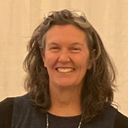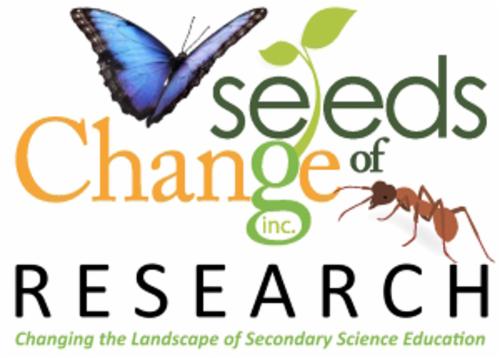FAST FACTS
- 10M people will die each year due to lack of antibiotics [1]
- The US will be 1M STEM students short of what’s needed [2]
- Globally, US high school students are ranked 25th in STEM [3]
- Development of critical thinking skills peaks during high school years [4]
FUNDRAISING GOAL
Construction of the following educational facilities in the Costa Rica rainforest:
- one (1) teaching laboratory
- ten (10) student housing cabins
- one (1) student dining hall
SEEDS OF CHANGE
Seeds of Change, Inc. is a Minnesota 501(C)(3) non-profit with the mission to "Change the Landscape of Secondary Science Education” by immersing high school students in tropical research experiences that ignite a passion for Science, Technology, Engineering and Math (STEM).
Seeds of Change scientific programs are designed to provide students with the microbiological and computational biology tools required for antibiotic discovery. By studying the natural habitats, behaviors, and biochemistry of native insects, students can participate in the discovery of groundbreaking new types of antibiotics while learning real-world critical thinking skills unobtainable in the typical classroom experience.
During the Seeds of Change Tropical Field Research Program, students experience hands-on field research focused on the biodiversity of the Costa Rican rainforest. They learn how to apply the scientific method while collaborating with fellow students and being mentored by world-renowned experts/scientists who guide them through the research process.
Through our efforts, Seeds of Change is strengthening the foundation of STEM learning in America and creating a workforce for future economic development.
Seeds of Change programs are designed to help students:
- awaken the natural curiosity & inspire student’s pursuit of STEM-based careers
- develop real-world grit and resilience by trial and error in hands-on research
- collaborate effectively with peers in teams
- communicate professionally to an academic audience
The first Seeds of Change immersion experience was offered in 2010, based on the work of world-famous tropical researcher Dr. Cameron Currie (University of Wisconsin at Madison). Our curriculum was developed by Currie’s graduate student, Dr. Adrián Pinto, who is now an honorary professor at the University of Wisconsin and a leading scientist at the University of Costa Rica.
The teaching research lab campus will provide the following functions:
[A] housing for visiting students
[B] housing for university scientists who lead student projects and research
[C] library facilities for researchers/PhD and scientists
[D] biological laboratories for university and high school scientists
[E] containment/maintenance facilities for molecular biology work
[F] network, video conference, and cloud communications to facilitate remote collaboration among students/university scientists
[G] scientific ecotourism conference center to create awareness of biological and environmental problems facing our planet
LAB LOCATION
The lab is located on the northeast slope of the Rincon De La Vieja volcano in north central Costa Rica. The land was donated by Minntica International SA, a group of investors from the U.S. and Costa Rica. The lab site is in a remote area that has been untouched by the tourism boom that has fueled commercial development in many areas of Costa Rica. This particular zone is blessed with extraordinary biodiversity due to the convergence of three microclimates: dry forest, rainforest and cloud forest.
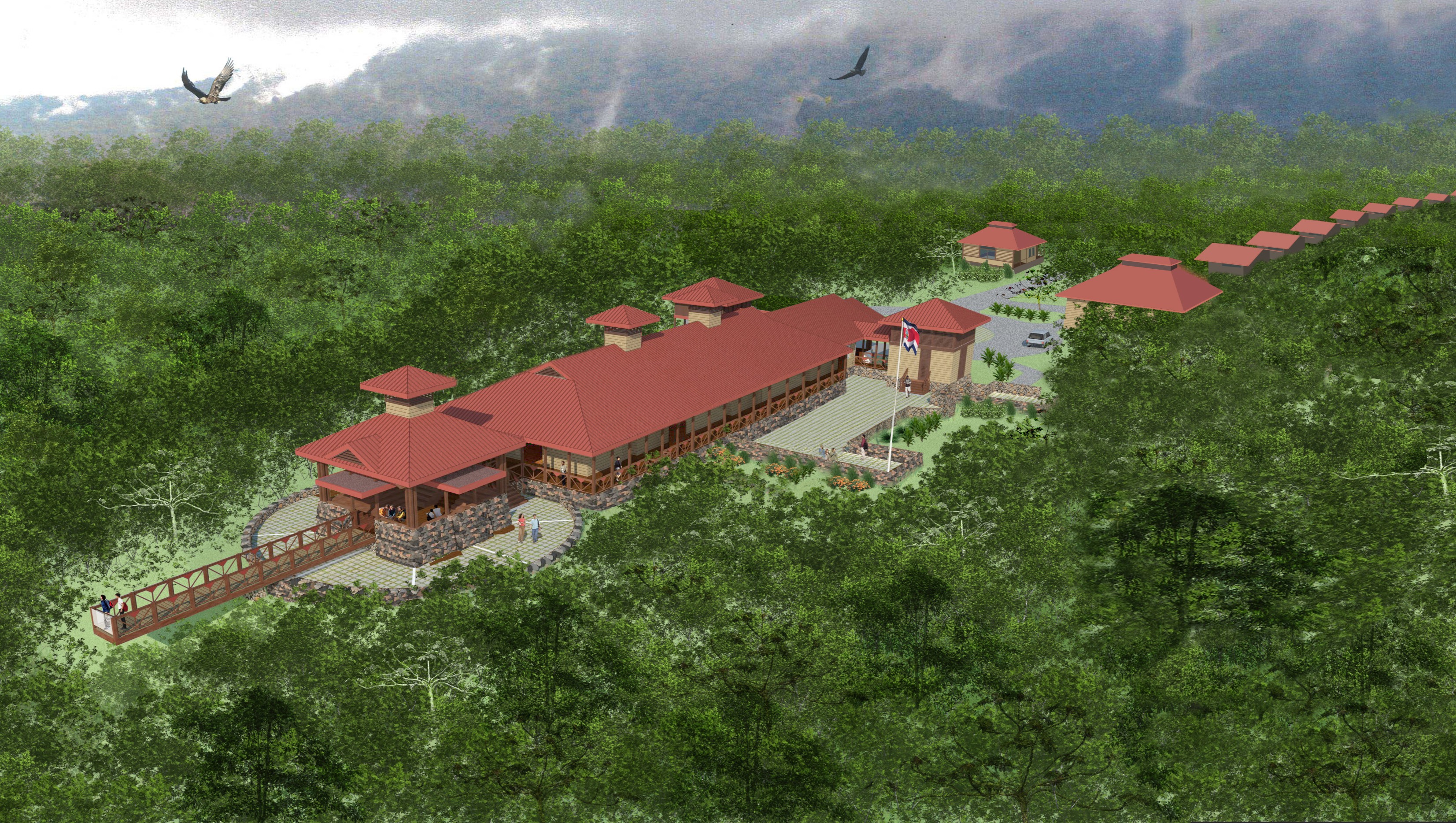
CONSTRUCTION DETAILS
This fundraiser is specifically to support:
- one (1) teaching laboratory facility
- ten (10) student housing cabins
- one (1) student dining hall
These buildings are made using about 30% concrete block and 70% natural wood (Laurel) from native trees in the area. Our realized building costs will be about $500 per square meter.
Cabins
Each cabin will host up to 4 students during their summer research experience. The cabins are situated on the campus with a view of the surrounding volcanos. Cabins may also be used by scientific ecotourism visitors in the non-summer months.
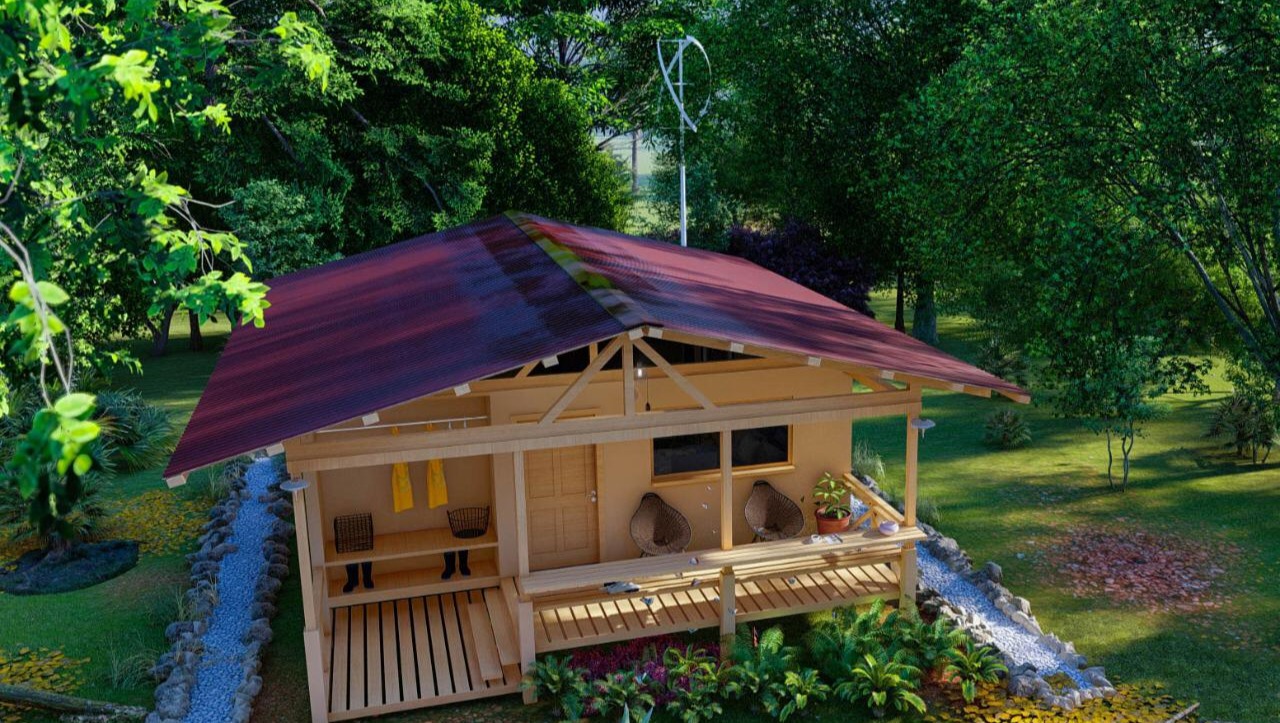
Cabin Perspective
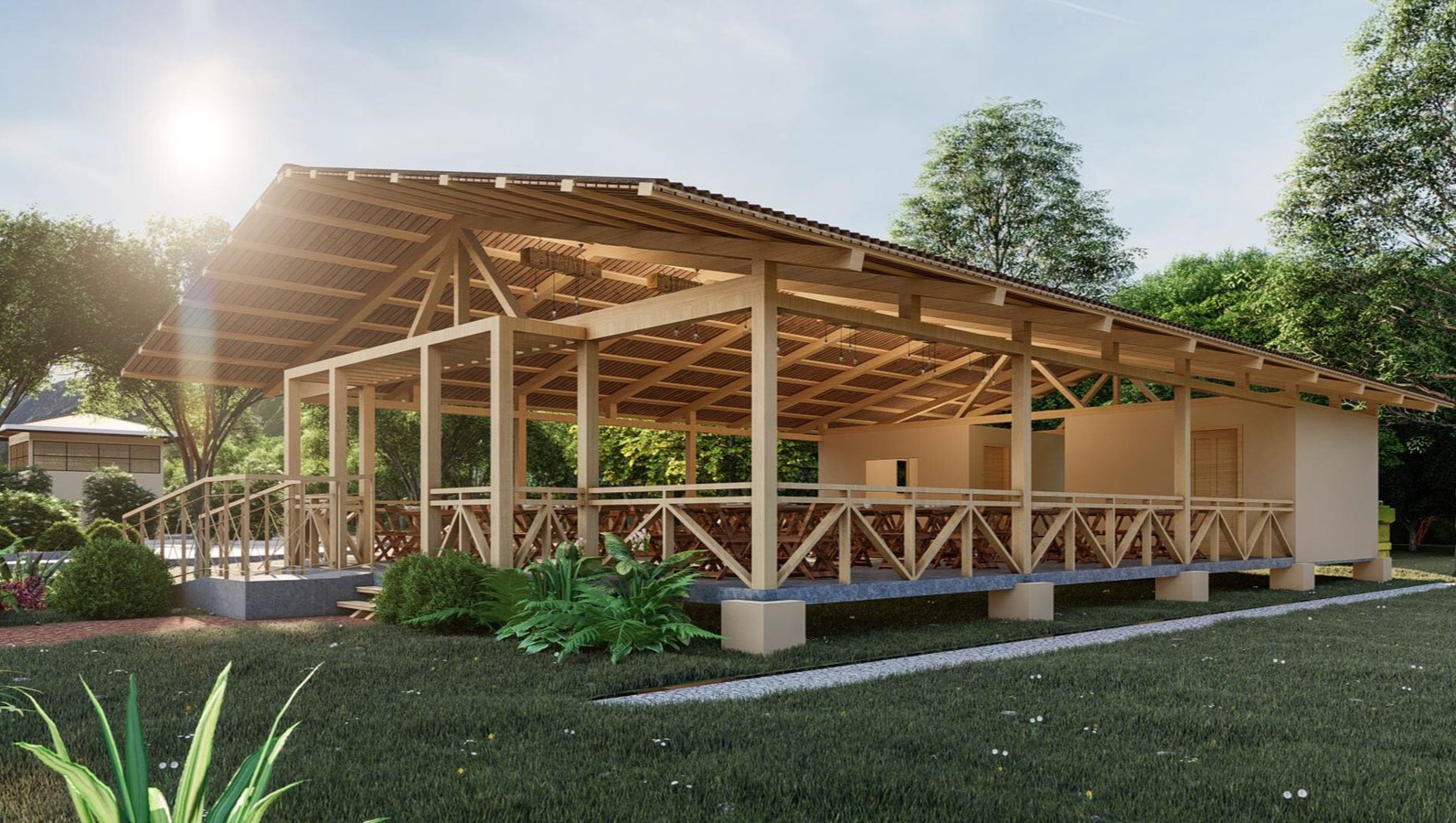
Dining Hall
Currently, up to sixteen (16) high schools participate in the SOC program during the summer months. With the additional cabins and dining hall we are looking to expand to capacity for up to thirty two (32) high schools per year.
The construction of the teaching research lab will allow for the education of high school students on site while at the same time providing the capability for PhD scientists to communicate with the high schools in the USA.
Both the lab and the partner schools will be working toward the development of new antibiotics.
"Changing the Landscape of Secondary Science Education" involves:
- connecting labs in US high schools to leading-edge research taking place at the SOC Lab in Costa Rica.
- engaging students in scientific discovery much earlier by creating bio-prospecting labs in high schools to aid in the discovery of new antibiotics.
Visit Seeds of Change at www.SOC-CR.org
VIDEO TESTIMONIALS
https://youtu.be/a719WpEFNYQ
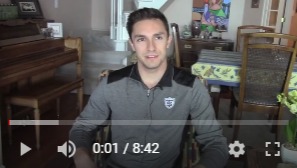
https://youtu.be/J_QT_As7Mc8
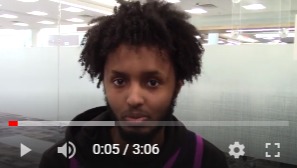
KEY MEMBER BIOS
John Doleman
John is the executive director of Seeds of Change. John graduated from South Dakota State in 1962 with an EE degree. He worked for Control Data (the first company to make solid state computers) where he was assigned to help customers including the CIA, NSA, DOD, our National Laboratories and NASA utilize supercomputer technology. Resource companies around the world used the technology developed by his group to locate and develop mineral resources, especially from space. His final assignment before retirement was to serve as the Control Data program manager on the design of our nation’s Space Station after the conclusion of the NASA Apollo program.
Dr. Adrian Pinto
Adrian graduated with a degree in Microbiology and Clinical Chemistry from the Faculty of Microbiology of the University of Costa Rica in 2000, earned his master’s degree in microbiology with an emphasis on cell and molecular biology from the University of Costa Rica in 2002 and obtained his doctorate in Microbiology from the University of Wisconsin-Madison based on work he did in Dr. Cameron Currie’s lab in 2009. He is a Professor at the University of Costa Rica's School of Medicine and he is an honorary faculty at the University of Wisconsin. Dr. Pinto’s research is in the area of microbial ecology and focuses on the symbiotic interactions between social insects and microorganisms, particularly those with potential applications in the discovery of new antibiotics.
Dr. Cameron Currie
Cameron graduated from the University of Alberta with a degree in biology in 1992 and stayed on to earn his master’s degree in entomology there in 1994. He then earned his doctorate in botany from the University of Toronto in 2000. Dr. Currie’s research focuses on the ecology and evolution of symbiotic associations between insects and microbes. He utilizes a cross-disciplinary approach incorporating ecological, evolutionary, behavioral, genetic, and microbiological approaches and employs molecular ecology and phylogenetic techniques to examine how microbes shape the biology of higher organisms. His main study system is the quadripartite association between fungus-growing ants, their fungal cultivars, mutualistic bacteria, and specialized garden pathogens. He is world famous for his work with leafcutter ants and he made the discovery that these ants used a powerful antibiotic for over 50 million years to protect their fungus gardens while our antibiotics are in a catastrophic decline after less than 100 years.
Dr. Gabriel Vargas
Gabriel has been the Lead Scientist for the Seeds of Change Bioinformatics program since its inception in 2014. This program teaches students how to run comparative analysis of genome and metagenome sequence data related to their unique research questions using the Integrated Microbial Genomes and Metagenomes database (IMG) and related tools. Recently he helped launch the Insect-Microbiome Antibiotic Bioprospecting Lab program by leading the pilot teacher training and helping develop the teacher training manual for the program. Gabriel graduated from the University of Costa Rica with a degree in microbiology (2009) and stayed to earn his master’s, also in microbiology (2014). He completed his doctorate in geophysical sciences at the University of Chicago (2020). Gabriel’s research at the U Chicago Coleman lab focused on developing genetics tools to study the biogeochemistry and ecology of microbial aquatic systems. He developed an expertise in computational genomics through his research and has taught several workshops at the University of Costa Rica related to microbial multi-omics analysis and phylogenetics. Gabriel is now a post-doctoral researcher with the Currie Lab at UW-Madison where he also collaborates with the Pinto Lab at the U. of Costa Rica.
Beth Hunt
Beth is the deputy director of Seeds of Change. She taught secondary science at prestigious private high schools for 20 years prior to joining Seeds of Change. In that capacity, she served as a research mentor to high school science research students that went on to win multiple awards at regional, national and international science fairs and competitions. Beth graduated from Dartmouth college and has a master’s degree in Civil and Environmental Engineering from the University of Massachusetts at Amherst. She has over a decade of experience working to characterize and remediate hazardous waste sites through engineering controls. Her master’s research project was on the biodegradation of petroleum products in subsurface soils, groundwater and soil gas.
Lori Boisclair
Lori is an expert in real estate development and equity placement with a great talent for building organizational relationships at the local, state and federal levels. She has spent 31 years with Boisclair Corporation and now serves as the company’s president. She has served on the boards of Boisclair Corporation, Seeds of Change, Parish Parishioner Council, St. Therese of Deephaven, Simpson Housing and Bluefin Bay on Lake Superior. She has served on the Seeds of Change Board since its inception and has guided the nonprofit through investments in our programs in Costa Rica.
REFERENCES
[1] 2016 Review on Antimicrobial Resistance Commission By the United Kingdom
[2] American Action Forum Report 2016
[3] The Program for International Student Assessment (PISA) 2018 ranking
[4] U of Chicago Huttenlocher- International Journal of Neurology 1983

